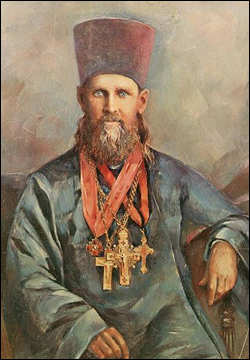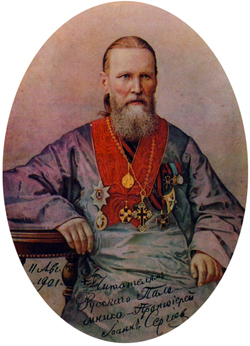 |
 |
|
 |
 |
|
|
(100th anniversary of the repose of St. John of Kronstadt)
December 20, 2008 by the old calendar (by the new calendar the date will be January 2, 2009) marks the 100th anniversary of the day of repose of the great Russian luminary, the righteous priest St. John of Kronstadt. St. John occupies a special place in the list of saints, being of great significance not only in spiritual terms, but also on a historical plane, having been sent by the Lord as erstwhile Jonah was to Nineveh, in order to prophesy to the Russian people and to the whole world the coming universal cataclysm and the onset of apostasy, i.e. the end times.
|
Memoirs of a Kronstadt resident
|

St. John of Kronstadt |
St. John of Kronstadt’s very appearance, especially in priestly garb, was enough to produce spiritual delight in the faithful, fortifying their faith in the Lord. His blue eyes, shining with love and prayerful inspiration, gave the impression that he saw Jesus Christ before him. This impression was strengthened by his moving and heartfelt exclamations and prayers, expressed as a petitionary conversation with the Lord Who was visible to him. The faithful were also struck by his lack of gray hair, very unusual for his 60-65 years of age, and especially by his extraordinary gait, which made it seem as though he were flying over the floor of the altar or the ambo, carried by the heavenly powers.
During the church services performed by St. John, the spacious St. Andrew’s Cathedral of which St. John was the rector was always full to the utmost. St. John’s powerful influence over the faithful was especially felt during general confession, which he was forced to use in view of the enormous number of people wishing to confess to him.
|
|
One can say with absolute assurance that there was not a single soul in the overcrowded church that did not wholeheartedly repent of its sins, naming them with loud weeping and wailing.
In order to be able to continuously entreat the Lord for others, St. John welcomed all the faithful who came to see him from all corners of Russia in his House of Industry, where special rooms were assigned for this purpose and were let out at minimum cost. Passing through these rooms, St. John served molebens for the visitors, miraculously healing their physical and spiritual illnesses, instructing and fortifying them in the Orthodox faith, and providing magnanimous material aid to the needy.
In view of St. John’s clairvoyance, those who came to these rooms with fraudulent claims, trying only to get money out of him, were totally unsuccessful. There were times when St. John, coming into a room and just glancing at an unknown visitor, would sternly say: “You are unworthy. Repent and cleanse yourself of your great sin through prayer and fasting, and then come back.”
The writer of these lines personally experienced St. John’s clairvoyance, when he was taken by his father to get Batyushka’s blessing: “Bless him, Batyushka, for he is going off to apply to the Cadet Corps.” Placing his hand on my head and half-closing his eyes, St. John confidently said: “You will pass.” – After that, as though seeing with his spiritual eyes the mortal danger that awaited me in the distant future, he added in an agitated voice: “Quickly make the sign of the cross.”
Sixteen years passed after that blessing, and the time came when during our “bloodless revolution” I was placed against the wall to be executed together with other officers. Unexpectedly for my own self, the command “Aim!” was interrupted by my semi-conscious but commanding voice: “Wait! Let me cross myself!” The several seconds that were spent in making the sign of the cross saved me from the terrible fate of the other officers, for in the meantime my soldiers hurriedly arrived and rescued me from inevitable execution.
Having given himself entirely over to the Lord God and to unfailing prayers for those who appealed to him in person and by mail, St. John still found time to publish religious works. The degree to which his writings were inspired by the Holy Spirit can be somewhat judged from his inspired homilies, which the faithful in church listened to with spiritual trepidation, since it seemed as though St. John were literally reading their doubtful thoughts and providing clear and concise answers to guide them on the path to eternal salvation.
For the poor and the indigent St. John was not only a miraculous intercessor before the Lord, but quite literally their provider, offering them material and financial aid. He received resources for such aid from wealthy people all over Russia, who wrote to him with fervent requests for prayer. Those who were particularly destitute gathered in great multitudes in front of his House of Industry, and after blessing them, St. John threw money out of a bag to them from the balcony. The same situation could be seen whenever St. John rode through the streets.
Providing an all-around example to the faithful during his life, even after his death St. John did not leave them without his intercession in the Heavenly Kingdom whenever they appealed to him with faith and prayer, receiving miraculous healing from the Lord.
S.K.
|
Kind pastor and miracle-worker
In the 1890s my family lived in Peterhof, the summer residence of the Russian emperors. At that time my father was the head of the Peterhof palace administration. I have no recollection of when and how my parents became acquainted with St. John of Kronstadt, but I know that St. John treated them with great affection. About six times a year St. John came to visit my parents. His arrival led to a great rise in religious fervor not only within our family, but also among our numerous staff. If my father happened to be away from home, he would be immediately informed of St. John’s arrival, and he would quickly return home, while St. John, as he waited for my father, sat in the living room and conversed with my mother and us children. As soon as my father arrived, St. John served a moleben and blessed all of us and all the members of our staff. After that he was invited into the dining room, where he only drank a cup of weak tea and ate a piece of white bread, and then proceeded to converse with my parents. When St. John departed, my father always gave him an envelope with money for the poor.
As soon as St. John appeared in the driveway, he was usually awaited by a huge crowd of people wishing to receive his blessing, or requesting his prayers for sick family members, or poor people asking for his aid. I saw with my own eyes how St. John would take out the envelope he had received from my father and would hand it over to a destitute person without knowing what sum was inside the envelope. Everyone knew of his extraordinary charity and kindness.
|

St. John of Kronstadt |
Many years have passed since then, but the image of the kind pastor has become deeply-ingrained in my memory: of middle height, lean and middle-aged, with blond hair, kind gray-blue eyes, and a penetrating glance, he always attracted us children. He was always dressed in a dark-gray cassock. He always had a calm appearance and spoke in calm but curt phrases. Among the local populace St. John of Kronstadt enjoyed the greatest respect, and people believed in that the Lord heard his prayers. Batyushka was a true pastor of our Orthodox Church.
In July of 1894 my father became very seriously ill from twisting of the bowels. Local physicians thought that an operation was necessary, and that it was impossible to do without one. Several medical luminaries from Moscow were summoned, while our palace physician, Dr. Yuditskiy, remained constantly at my father’s bedside.
|
|
The Moscow doctors arrived in the morning and also confirmed the absolute necessity of an operation, which was scheduled for 7:00 in the evening. By that time all the requisite materials were to be delivered from our palace hospital. My mother sent a telegram to St. John in the city of Kronstadt, asking him to pray for my father. At 3:00 in the afternoon my father was visited by Emperor Alexander III, while at 4:00 St. John himself arrived.
This time he seemed very concerned and concentrated, and immediately went into the bedroom of my father, who lay there with a very high fever. St. John, who was usually calm and quiet, served a moleben very nervously this time.
When he finished the moleben, he came up to my father’s bed and said: “Dmitriy Stepanovich, in the name of our Lord Jesus Christ, sit up!” – Dr. Yuditskiy, who was nearby, ran up to St. John, exclaiming: “Batyushka, the sick man should not move, because his bowels may become perforated!” – To this St. John replied very firmly: “Everything is possible in the name of the Lord” and, turning to my father, again said: “In the name of our Lord Jesus Christ, I command you to sit!” Holding a cross in his right hand, with the left he helped my father to sit up. He then sprinkled my sick father with holy water, and after crossing him with the cross, he gave him the cross to kiss, then leaned over my father and kissed him, saying: “The Lord God will make you well; now lay down quietly.”
We all kissed the cross, after which St. John went out into the hall next door and gave everyone else the cross to kiss. After that St. John was invited by my mother into the dining room, where, as usual, he drank a cup of weak tea and ate a piece of white bread.
As soon as St. John left my father’s bedroom, Dr. Yuditskiy came up to my father and checked his pulse. The pulse had fallen rapidly. Believing that this could have happened because of a perforation of the bowels, Dr. Yuditskiy ran down to the lower floor where the guestrooms were, as well as my father’s reception room and office, and where all the guest surgeons were waiting for the evening and the appointed operation. He reported that the sick man’s pulse had fallen rapidly, and that a perforation had probably occurred. The doctors hurried upstairs to my father’s bedroom. The pulse was normal, and from a high fever the temperature had fallen down to almost normal. The doctors waited for about an hour, in case this was a perforation, but then they were forced to admit that the illness was gone.
The Lord had heeded St. John’s prayers, and my father rapidly regained his health and soon afterwards was able to resume his official duties. This miracle of healing was known to all: from Emperor Alexander III and Empress Maria Fedorovna down to the last servant in Peterhof.
Colonel N.D. Pleshko
|
 |
|
|
|
|
 |